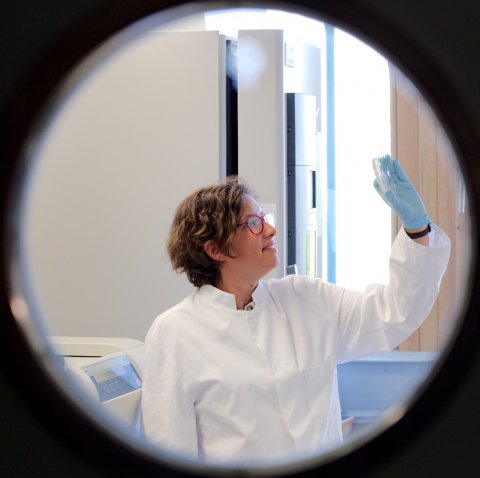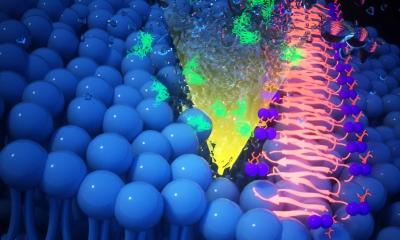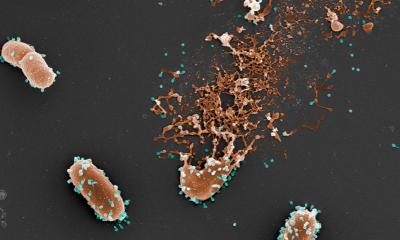News • Survival specialists
Systems biology of antibiotics
Bacteria can quickly become resistant to antibiotics. Which mechanisms are responsible for this and how to counteract it? Dr. Ana Rita Brochado, who is setting up a new Emmy Noether Junior Research Group at the University of Würzburg, is investigating this.

Bacteria have fascinating properties. They adapt excellently to their respective environment, and they existed long before humans. Their toughness has led to the fact that bacteria have successfully spread all over the world for three billion years – even in places where humans could not survive, for example in the hottest springs and in the coldest places on earth. However, they were only discovered a few hundred years ago. Since that time, research has been examining these tiny creatures more and more closely.
Biotechnology engineer Dr. Ana Rita Brochado has also taken a liking to microbes. She has been setting up an Emmy Noether Junior Research Group at the Biocenter of Julius-Maximilians-Universität Würzburg (JMU) in Bavaria, Germany, since early 2019. Her topic: "Systems Biology of Antibiotics in Gram-negatives."
Dr. Brochado is funded by the JMU Biocenter Nachwuchsprogramm, by the ZINF Young Investigator program and by the German Research Foundation (DFG). The Emmy Noether Programme by DFG offers outstanding young researchers the opportunity to lead junior research groups on their own responsibility and thus qualify for a professorship. The DFG will provide Brochado with up to 1,82 million euros for her group.
Recommended article

Article • Differentiate and select
Myths and truths about antibiotics, antiseptics and vaccination
Sixty-two percent of Germans fear antibiotic resistance, according to a survey recently conducted by the German Federal Institute for Risk Assessment. ‘Patients colonised by multi-resistant pathogens are particularly scared. But many of these fears are rooted in misunderstandings,’ explained Professor Mathias Pletz at the Congress for Infectious Diseases and Tropical Medicine (KIT).
Gram-negative bacteria at a glance
Dr. Brochado is interested in bacterial pathogens. "Bacteria are very small but extremely tough creatures. They use complex mechanisms to cope with their environmental conditions," said the researcher. This can lead to problems if they infect humans. "Mutations can quickly make bacteria resistant to antibiotics that will no longer work," she explains. "The weapons with which medicine fights bacterial infections quickly become dull. New strategies are permanently in demand.”
Her research focuses particularly on gram-negative bacteria. These are infectious agents which are particularly difficult to treat, due to the complex structure of their cellular envelope: in addition to the cell wall, they have an external biomembrane that makes them very resistant to external compounds, such as antibiotics.
Reviving old antibiotics with vanilla against pathogens
Ana Rita Brochado and her group are investigating the molecular mechanisms underlying antibiotic activity using a systems biology approach. "It is not the case that bacteria simply die when they come into contact with an antibiotic," she explains, "in this process numerous mechanisms are set in motion. We will use different compounds alone and in combination to better understand the complexity of the bacterial response to these compounds.”
Among other things, the scientist showed that different bacteria react in a very specific manner to antibiotic combinations, and also that food compounds can be used to enhance the activity of antibiotics against resistant bacteria. For instance, particular clinical isolates of Escherichia coli which are resistant to the antibiotic spectinomycin could be successfully combated by combining the antibiotic with the aroma substance vanillin (Brochado et al., Nature, 2018). Vanillin is the major component of vanilla flavor.
24.05.2019





